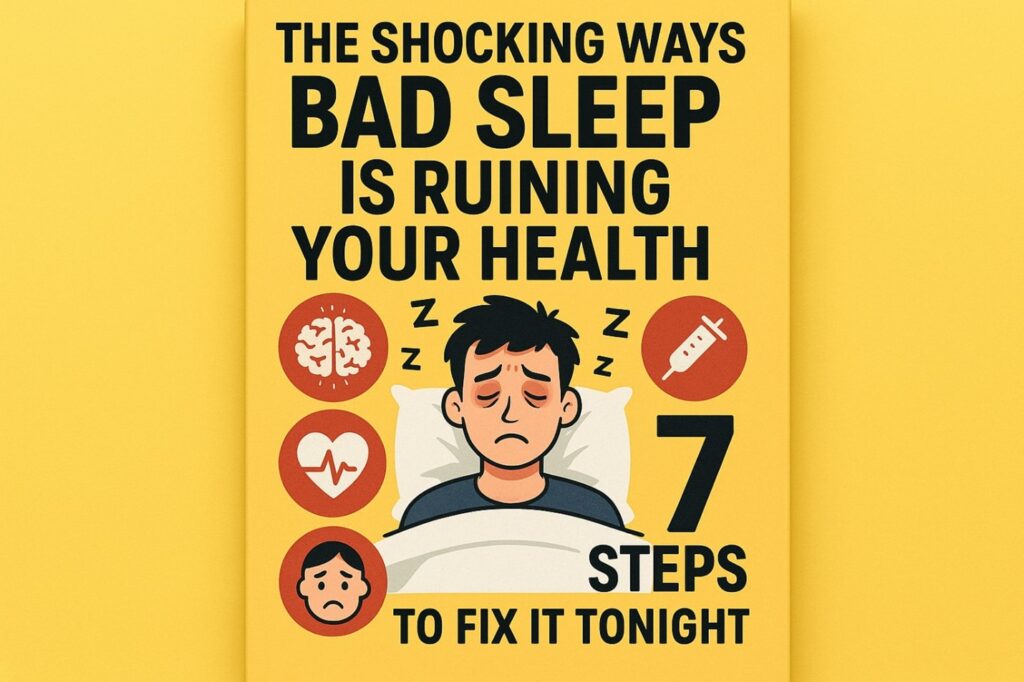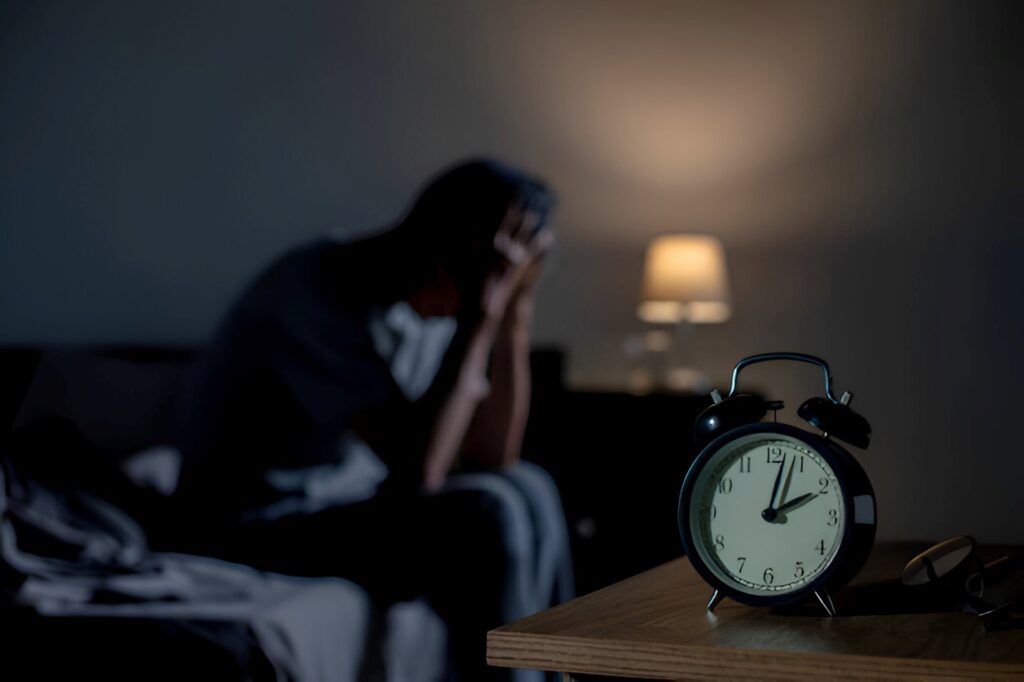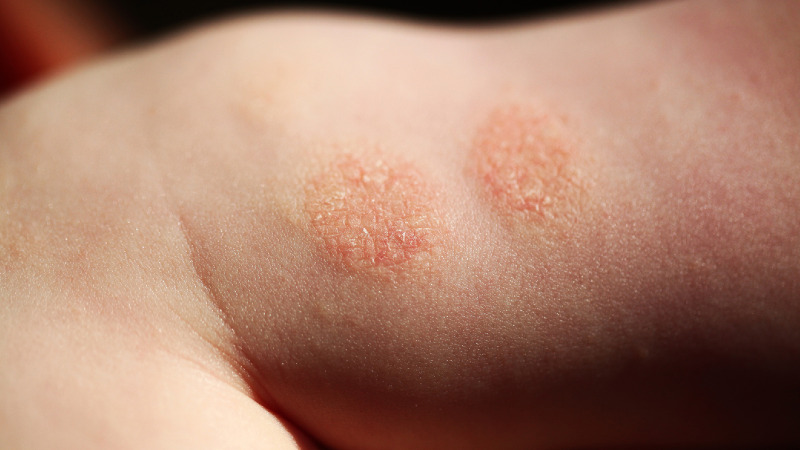Bad Sleep Health Risks Fix With 7 Ways
Being unable to sleep well is simply an inconvenience to most of us. You get up hungover, get one additional cup of coffee and drag on with life. But what would you say if I were to tell you that insufficient sleep is silently destroying your body, brain and long-term health in ways that you cannot ignore?
Stress the heart, impair your immunity, consequently, as well as causing chronic illnesses, adding pounds, and even forgetting someone, poor sleep has actually been associated with it. But the good news is that once you know the effects of insufficient sleep, you can be in charge and change the situation, sometimes as soon as tonight.

The Hidden Effects of Bad Sleep on Your Health
Even after one night of bad sleep, science demonstrates that the body is impacted. The reaction times are reduced, the focus becomes poor, and the mood becomes depressed. Over time, the damage adds up. Inadequate rest is chronic when associated with:
- Heart Disease & Stroke: Sleep deprivation enhances blood pressure and inflammation, leading to increased risk to the cardiovascular system.
- Diabetes & Weight Gain: Sleep deprivation due to lack of sleep affects insulin control and hunger hormone-producing chemicals that cause sugar cravings and fat buildup.
- Weakened Immunity: Your body is capable of healing during the night. You are susceptible to infections without enough rest.
- Early Ageing: Sleep deprivation increases skin ageing, lowers collagen, and causes oxidative stress that harms cells.
The health risks of bad sleep are much more than merely how drained you are in the morning; it has the potential to literally reduce your life instalment.
Bad Sleep Symptoms You Shouldn’t Ignore
Can you tell whether your sleep is insufficient or not? Some signs are sometimes obvious, such as tossing and turning at night. On other occasions, the bad sleep symptoms are minor but no less harmful.
Common Symptoms of Poor Sleep Quality
- Waking up tired even after 7-8 hours in bed.
- Frequent headaches or brain fog.
- Sudden mood swings, irritability, or anxiety.
- Difficulty focusing or remembering things.
- Constant reliance on caffeine or sugar for energy.
Although these signs of poor sleep quality can be minor, once they continue, they act as warning bells to underlying problems in your body.
Causes of Bad Sleep at Night
When you have issues with rest, the best thing you can do is find out why. The causes of bad sleep at night depend on each person, but the most common include:
- Stress and Anxiety: It is difficult to sleep due to the increased level of Cortisol, caused by the thought process, which is exceptionally high.
- Poor Sleep Environment: A Hot bedroom, excessive light, and a noisy atmosphere can interfere with sleep.
- Technology Overload: Your sleep hormone, melatonin, is inhibited by blue lights on the screen.
- Caffeine, Alcohol, or Heavy Meals: These stimulate or mess up deep-sleep stages of the body.
- Sleep Disorders: Sleep apnea or restless leg syndrome are conditions that have no known diagnosis, but significantly affect the quality of sleep.
With these underlying causes solved, you can correct bad sleep habits before they can degenerate into serious health problems.
Bad Sleep and Mental Health: A Vicious Cycle
Bad sleep is one of the most harmful effects on the brain. Mental health is closely linked to poor rest, and it can form a vicious cycle that is difficult to overcome.
Not getting enough sleep enhances stress hormones, thus making you very likely to experience anxiety. It also interferes with the activity of the neurotransmitters such as serotonin and dopamine that control mood. With time, bad sleep and mental health issues only boost one another: insomnia predisposes people to depression, and depression leads to difficulty sleeping.
It has also been found that bad sleep directly affects the brain. Memory consolidation occurs during your sleep, and that is why lack of sleep impairs your capacity to learn as well as to remember, and even to make decisions. A single stormy night of sleep impairs attention at least as thoroughly as intoxication by one’s spouse.
When you are constantly exhausted, forgetting, or feeling depressed, sleep might be the cause behind the issue. To elaborate more on how to safeguard both mind and body, visit Healthabulous, where we spread out research-confirmed healthful remedies.
7 Steps to Fix Bad Sleep Tonight
The good news? Regardless of the duration of bad sleep, you can get yourself back into this release pattern with straightforward changes that will help you have a good sleep again. The following are seven evidence-based tips you can begin this evening:
1. Create a Consistent Sleep Schedule
Wake up and go to bed at the same time daily, even on weekends. When you exercise a routine, your internal clock is trained, which is why you find it easy to fall asleep and naturally get up.
2. Optimise Your Bedroom Environment
The best sleep havens are calm, dark, and quiet rooms. Distractors can be blocked by blackout curtains, earplugs or white noise machines. A comfortable pillow and a comfortable mattress also contribute to the prevention of bad sleep symptoms, such as stiffness and headache, to a large extent.
3. Cut Screen Time Before Bed
Phones, television and laptops emit blue light that inhibits melatonin. Experiment with a digital sunset (an hour before bed), mirroring reading, meditation, or journaling.
4. Watch What You Eat and Drink
Caffeine should be avoided after 2 PM, and alcohol should be minimised near bedtime. You can also be up late at night because of heavy meals. Instead, you should use light, sleep-inducing foods such as almonds, bananas, or herbal teas.
5. Manage Stress Effectively
As stress is one of the most common causes of poor sleep at night, relaxation is a necessity. Taking a deep breath, practising some gentle yoga or mindfulness can relax your nervous system and prepare your system to sleep.
6. Get Natural Light During the Day
Exposure to light plays a role in the sleep-wake cycle of your body. Get at least 15 minutes of natural sunlight in the morning to reset your circadian rhythm.
7. Consider Natural Remedies
Unless lifestyle changes can suffice, some natural solutions can help. Chamomile root or valerian root tea may promote relaxation, and magnesium supplements are typically used to promote profound rest. Most individuals also research bad sleep remedies 2025, such as bright lights that replicate the natural cycle of sunrise or wearable sleep devices.
How to Improve Bad Sleep Without Medication
Sleeping pills do not solve the problem and can lead to addiction among many people who use them. When it comes to how to fix bad sleep naturally, the only thing you want to follow is consistency and patience. Several ways of improving sleep habits, reducing stress, and forming better evening practices often affect the process, with no adverse side effects.
Fixes based on lifestyle maintain your mental well-being as well. Instead of pills that make you sleep, natural approaches will put your body back to sleep in its entire cycles, which are very important to memory, concentration, and mood.
Tips to Recover from Bad Sleep Quickly
Naturally, there are nights when it will be tough. After you wake up exhausted, here are fast remedies:
- Take a 20-minute power nap (stretch it any longer and you are likely to be groggy).
- Keep yourself hydrated because losing water increases tiredness.
- Take light exercise; an outside walk will reset your clock.
- Additional caffeine should be avoided after noon so that another sleepless night is avoided.
These tips to recover from bad sleep quickly will get you through the day, even as you get yourself back on track in the evening.

Conclusion
The dangers of bad sleep are something we underestimate because we wave it off as being tired. In fact, the effects of bad sleep permeate throughout all aspects of your life, including your heart health and immune system, memory and emotional stability.
The good thing is you do not need to live in fatigue. You can achieve restful, deep rest by solving the causes of bad sleep, changing your habits and following the seven steps listed here. The only difference is that you need to do it, and do it tonight, and your future self will appreciate it.
To get more sleep and wellness tips, which are scientifically supported, visit Healthabulous, where we give you actionable guides on how to live a healthier life.
FAQs About Bad Sleep
1. What are the most common causes of bad sleep?
The largest culprits are stress, use of technology before bed, poor sleep environment, and some health conditions, such as sleep apnea.
2. Can bad sleep really affect long-term health?
Yes. Insomnia is associated with chronic poor sleep, which is associated with obesity, diabetes, heart disease or even decreased life expectancy.
3. How do I know if my bad sleep is profound?
When you always feel tired, depend on caffeine or always go to bed but still feel unrested, it might be time to visit the doctor.
4. What natural remedies help with sleep?
Some of the best natural alternatives include chamomile tea, magnesium supplements, lavender oil and relaxation.
5. How fast can I fix my bad sleep habits?
Certain modifications can be effective in a matter of days, such as decreasing time on screens. Nevertheless, complete advancements usually occur after a couple of weeks of adherence.







